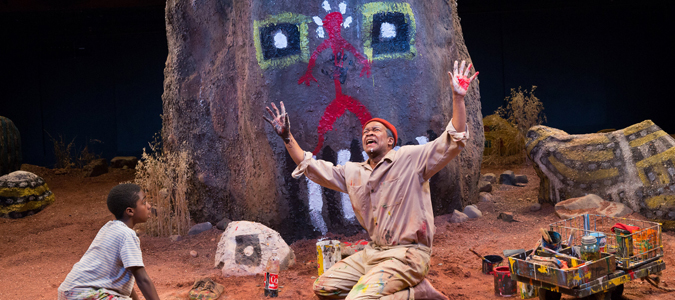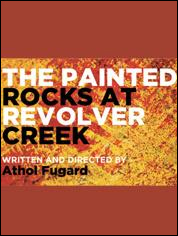

The Painted Rocks at Revolver Creek
Opening Night: May 11, 2015
Closing: May 31, 2015
Theater: Signature Theatre
Aging farm laborer Nukain has spent his life transforming the rocks at Revolver Creek into a vibrant garden of painted flowers. Now, the final unpainted rock, as well as his young companion Bokkie, has forced Nukain to confront his legacy as a painter, a person and a black man in 1980s South Africa. When the landowner’s wife arrives with demands about the painting, the profound rifts of a country hurtling toward the end of apartheid are laid bare.
BUY TICKETSREAD THE REVIEWS:
May 11, 2015
“They got eyes but they do not see us,” says the gentle old man to the young boy in “The Painted Rocks at Revolver Creek,” the tender, ruminative new play written and directed by Athol Fugard. Both man and boy are black South Africans, and the man’s observation refers to the white farmers for whom he works. More broadly, of course, the words refer to the culture of apartheid, and the moral blindness on which it was based. Mr. Fugard has been anatomizing the evils of apartheid, and the troubling legacies it left behind, throughout his long and distinguished career. His new play, which opened on Monday at the Signature Theater, considers both the brutal injustices of apartheid and the violence that roiled South Africa after its dismantling. The first act takes place in 1981. It’s a Sunday morning, which means Nukain (Leon Addison Brown), the old farmworker, has a personal chore to do: paint in bright colors the rocks that dot the dry landscape. The creation of these “flowers,” as he calls them, was a task he began years before, and which has become a weekly pleasure he shares with young Bokkie (Caleb McLaughlin), the 11-year-old boy in his charge. (The play was inspired by the life of the outsider artist Nukain Mabuza, although a program note makes clear that the details are fictionalized.)
READ THE REVIEW


















